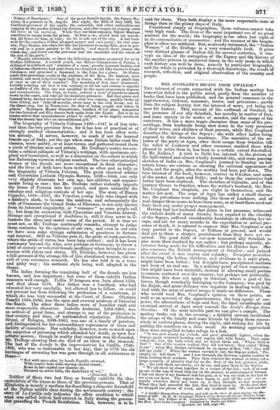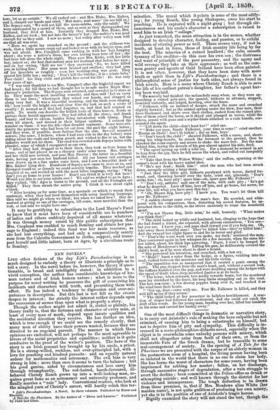MRS. °COPLAND'S ESCAPE FROM GWAEIOR..*
THE interest of events connected with the Indian mutiny has somewhat faded in the public mind, partly from the number of books that have been published, and the general sameness in the apprehension, violence, massacre, terror, and privations ; partly from the subject having lost the interest of news, yet being too near for history. This account of the outbreak at Gwalior, in the presence of our ally Scindiah, has novelty in matter of fact, and some variety in its modes of murder, and the escape of the survivors. It has a more tragic character than some of the pro- ceedings, from husbands being shot down in the verynee of their wives' and children of their parents while Mrs. Coopland describes the doings of the Sepoys ; she with other ladies being exposed to their drunken insolence. The narrative of the so- journ of the party at Agra., after their escape from Gwalior, till the relief of Luaknow and other successes enabled those who pleased to retire from it, has been to a certain extent forestalled by Mr. Itaikes.-f A visit to Delhi has interest in the picture of the half-ruined and almost wholly deserted city, and some passing sketches of India on Mrs. Coopland's journey to Bombay on her return home, are curious as showing the external appearance of India and the people, after the mutiny had been put down. The true interest of the book, however, centres in Gwalior, and some of the scenes at Agra and Delhi; rind to these the narrative had better have been confined. The sketches of Calcutta, and of the journey thence to Gwalior, where the writer's husband, the Rev. Mr. Coopland was chaplain, are slight in themselves, and the matter not new. The Beige of Agra has rather a small charac- ter; the privations were nothing like those of Lueknow, and of real danger there seems to have been none, or at least there need net have been any under proper management. Having had her husband shot down in her presence, witnessed the violent death of many friends, been exposed to the ribaldry of the Sepoys, suffered considerable hardships in effecting her es- cape, and sat for many months in the expectation or actual pre- sence of death, it is natural to suppose that Mrs. Coopland is not very partial to the Sepoys, or Indians in general, and would deal out to them a sharper punishment than they have yet re- ceived. The good faith of our now honoured ally Seindiah is also more than doubted by our author ; but perhaps unjustly, al- lowance being made for his difficulties and Ins Hindoo race. She also censures the British management at Gwalior; and judged after the event it was supine end unlucky. Prompter measures in removing the ladies, children, and civilians to a safer place, might have been better ; but it might have precipitated matters. and been of no real use. In a military point of view concentra- tion might have been desirable, instead of allowing small parties to remain scattered over the country, but perhaps not politically. However, this does not apply to Gwalior, where a part of the forces though nominally belonging to the Company, was paid by the Rajah, and great delicacy was requisite in dealing with him. And with the mass of native troops it made no difference. Those who would read Mrs. Coopland's opinion on these points, as well as an account of the apprehensions' the long agony of sus- pense, the alternations of hope and fear' the final catastrophe and eventual arrival at Agra must consult the Lady's Escape fro2n Gwalior. Of the most terrible part we can give a sample. The mutiny broke out in the evening ; a faithful servant facilitated the escape of the family and some friends by hiding them succes- sively in various places, during the night, and risking his life by putting the searchers on a false scent. As morning approached they were compelled to take refuge in a hut. "It was now nearly six o'clock, and grew gradually lighter, when the Sepoys again returned howling and raging like wild beasts. They came round the hut, the baby cried, and we heard them ask, Whose child is that' ? One of the women replied they did not know ; they called 'Bring it out' ; when Mrs. Raikes exclaimed in an agony of fear, Oh! they will kill my child ' ! When the woman carried it out, the Sepoys yelled, ' Fe- ringhi, hi : kill them ' ! and I saw through the doorway a great number of them holding their muskets. They then ordered the woman to bring out a large Quantity of plunder that lay on the floor of the hut, pictures, plate, &c.,• Mie took them out slowly, one by one, and gave them to the Sepoys. " We all stood up close together in a corner of the hut ; each of us took up one of the logs of wood that lay on the ground, as some means of defence. I did not know if my husband had his gun, as it was too dark in the hut to see even our faces. The sepoys then began to pull off the roof: the co- wardly wretches dared not come in, as they thought we had weapon'. When they had unroofed the hut, they fired in upon us, At the first staTt we dropped our pieces of wood, and my husband said, We will not Or • A Lady's Escapefrom Gwatior, and L(fe in the Fort of .Agra duly' therhfa-,.. finks of 1851. By R. SI. Coopland, Widow of the Reverend George.Wichhipaote, IL 51.A., late Fellow of fit. Catherine's College, Cambridge, nd the Hon. East India Company. Published by Smith and Elder. t Spectator for 1858, page 783.
here, let us go outside.' We all rushed out : and Mrs. Blake, Mrs. Raikes, and I, clasped our hands and cried, Mut mare, mut mare' (do not kill us.) The Sepoys said, We will not kill the mem-sahibs, only the sahib.' We were surrounded by a crowd of them, and as soon as they distinguished my husband, they fired at him. Instantly they dragged Mrs. Blake, Mrs. Raikes, and me back; but not into the bearer's hut ; the mehter's was good enough for us they said. I saw no more ; but volley after volley soon told me that all was over.
"Here we again lay crouched on the ground ; and the stillness was such, that a little mouse crept out and looked at us with its bright eyes, and was not afraid. Mrs. Campbell came rushing in with her hair hanging about ; she wore a native's dress, her own having been torn off' her ; she had been left alone the whole night. Then poor Mrs. Kirke, with her little boy, joined us; she had that instant seen her husband shot before her eyes ; and on her crying, Kill me too' ! they answered, 'No, we have killed you in killing him.' Her arms were bruised and swollen ; they had torn off her bracelets so roughly : even her wedding-ring was gone. They pared her little boy ; saying ; Don't kill the batcha ; it is a mimic baba.' Poor child ! his long curls and girlish face saved his life ! He was only four years of age.
"I was very thankful to see Mrs. Campbell after the frightful report we had heard ; for till then we had thought her to be safe under Major Mac- pherson's protection. The Sepoys soon returned, and crowded in to stare at us. They made the most insulting remarks, and then said Let us carry them to our lines ; ' whereupon they seized our hands, and dragged us along very fast. It was a beautiful morning, and the birds were singing. Oh! how could the bright sun and clear blue sky look on such a scene of cruelty ! It seemed as if God had forgotten us, and that hell reigned on earth. No words can describe the hellish looks of these human, fiends or picture their horrid appearance : they had rifled all the stores, and drank brandy and beer to excess, besides being intoxicated with bhang. They were all armed, and dressed in their fatigue uniform. I noticed the number on them : it was the 4th—that dreaded regiment. Some were evi- dently the prisoners who had been let out from the gaol the night before ; and they were, if possible, more furious than the rest. Several mounted sowers, (the same, I believe, whom I had seen ride in the day before) were riding about the roads and keeping guard, and wished to fire at us, but the infantry would not let them. The road was crowded with Sepoys laden with plunder, some of which I recognized as our own.
"After they had dragged us to their lines, they took us from house to house, and at last placed us on a charpoy under some trees. Mrs. Gilbert and her child now arrived, and poor Mrs. Proctor ; the latter in a dreadful state having just seen her husband killed. All our horses and carriages were drawn up in a line under some trees, and I saw a beautiful Arab of Mrs. Raikes' lying shot. Hundreds of Sepoys now came to stare at us, and thronged round us so densely we could scarcely breathe. They mocked and laughed at us, and reviled us with the most bitter language, saying : 'Why don't you go home to your houses ? Don't you think it is very hot here. Would you like to see your sahibs now ? We said we wished to go to Agra ; they replied, Oh! Agra is burnt to the ground, and all the Feringhis are killed.' They then struck the native gong. I think it was about eight o'clock.
"After keeping us for some time, as a spectacle on which to wreak their contempt, when they had tired themselves with using insulting language, they said we might go where we liked ; but when we asked how ? they de- murred at giving us one of the carriages, till some, more merciful than the rest, at last said we might have one.
It may be gratifying to subscribers to the Lord Mayor's Fund to know that it must have been of considerable use to numbers of ladies and others suddenly, deprived of all means whatever. It was through money raised by this public subscription that Mrs. Coopland was enabled to reach Bombay and obtain her pas- sage to England ; indeed this fund was her main resource, as she had lost everything, and had only a comparatively scanty sum from the Calcutta Government to clothe, support, and trans- port herself and little infant, born at Agra, by a circuitous route to Bombay.



























 Previous page
Previous page